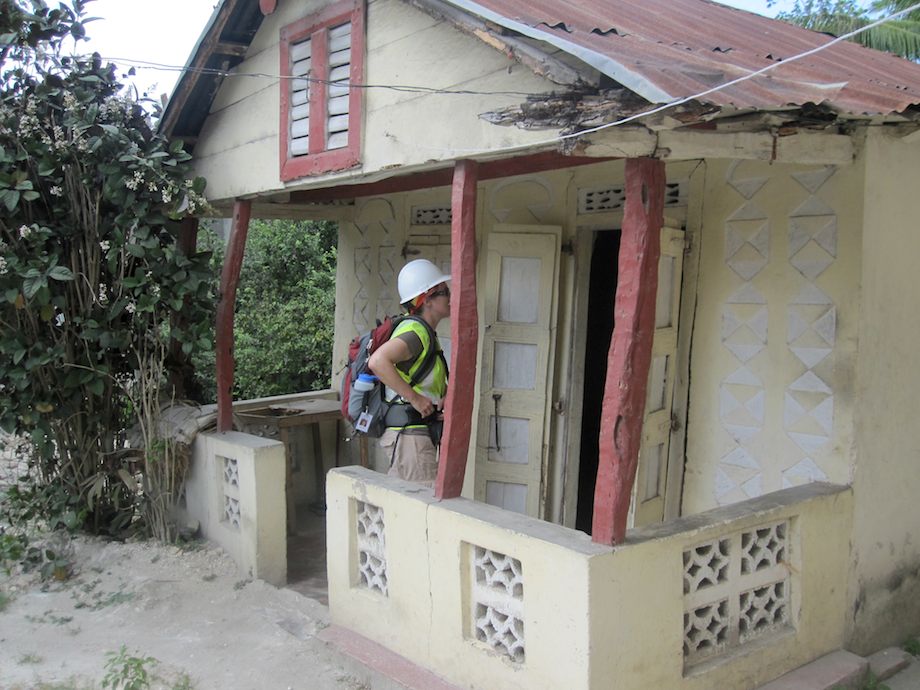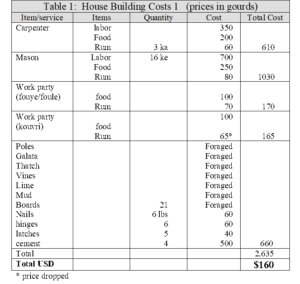House manufacturing is a massive, essential and rising financial and social activity for the Haitian folks. It is likewise an activity that has created million of job opportunities for the Haitians.
Most Haitians live in makeshift shelters made from mud, cardboard, salvaged wood and corrugated metal. Haiti is one of the poorest countries in the western world. Over a third of its 10 million people live in abject poverty. Hundreds of thousands subsist on less than $1.90 a day; some 200,000 on less than $1 a day. Despite the presence of U.N peacekeepers, serious crime is rampant.

How much does it cost to build a house in haiti
How to buy land in Haiti, can foreigners own land in Haiti, land ownership in Haiti. How much does it cost to build a house in Haiti? What are the building codes like? What are some of the housing options available for expats?
The cost of building a house in Haiti depends on your budget and the type of home you want to build. The average price for a basic 2 bedroom home can be $15,000 USD while a luxury 5 bedroom villa can cost up to $250,000 USD. You can also rent an apartment or condo in Port-au-Prince for between $500-$1000 USD per month.
Haiti has an abundance of natural resources, including fertile soil and rich mineral deposits. The country’s economy is supported by agriculture, mining and manufacturing industries as well as tourism. Foreigners can purchase property here without restrictions on ownership but their rights may be limited if they do not officially register ownership through one of two government agencies: the INA (Institut National de l’Aménagement) or HABITAT (Haïti Bureau d’Etudes et d’Informations techniques). Land ownership requires a title deed which
Why? Because it is a very poor country, and the cost of living there is very low. But you can really make it happen if you want to.

Land ownership in Haiti
to buy land in haiti, you will need to find a property that is for sale. The easiest way to do this is to contact an estate agent, who will set up viewings and help you negotiate a price with the vendor. You can also find properties for sale on websites such as Craigslist and eBay, though these are usually more expensive than those listed directly by real estate agents.
Once you have selected a property, you must pay the deposit and sign a contract. The deposit should be about 10% of the purchase price and paid in cash (USD or HTG). The contract will include details of your payment schedule and other conditions of sale, such as when title transfer will take place. In most cases, it’s possible to make monthly payments of 1/12th of the purchase price until the full amount has been paid off.
If you want to build your own home or renovate an existing one, some things are easier than they were before the earthquake: building permits are cheaper and faster; there are fewer restrictions on materials; there’s less red tape in general; and contractors are still available for hire on reasonable rates. However, if you want something special or unusual (for example), it may be hard to find someone who can
How much does it cost to build a house in Haiti? The answer is: It depends. There are many factors that go into determining how much it will cost to build a house in Haiti.
Here are some of them:
The size of the land you buy (or rent). If you buy land yourself, then you need to consider the price per square meter of property. If you rent from someone else, then the price will be determined by what the owner charges for rent. If your building permit is approved, then you can start building immediately and avoid paying any fines or fees related to this issue. On the other hand, if your permit has not been approved yet or if there are problems with it, then you may have to wait until those problems have been resolved before continuing construction. This can add months onto your construction time and increase costs significantly since an architect or builder cannot work without having all necessary permits in place first. In addition, if something goes wrong during construction (such as unsafe building practices) then there may be additional costs associated with fixing those problems later on down the road.
The average cost of building a house in Haiti is between $15,000 and $20,000. This number can vary depending on the size and type of home that you want to build.

The cost will also be affected by other factors including:
The type of materials used (wood vs. concrete)
The location (urban vs. rural)
The quality of construction (poorly built structures are more likely to collapse during an earthquake)
Haiti is a country where buying and owning land can be quite difficult, as there are certain restrictions in place.
In order to buy property in Haiti, you must have a Haitian spouse or child. There are also other factors that will determine whether or not you are eligible to buy land.
Can Foreigners Buy Land in Haiti
The answer to this question is yes and no. If you’re from another country and want to purchase land in Haiti, then your options are limited. In order to buy property in Haiti, you must have a Haitian spouse or child. There are also other factors that will determine whether or not you are eligible to buy land.
Things You Need When Buying Property in Haiti
When purchasing Haitian land, there is no maximum amount of money that can be spent on the property itself (as long as it meets the requirements).
However, there are certain things that need to be paid for upfront before purchasing any type of property in Haiti:
Registration fees – $1,000 ($500 if you pay within 30 days)
Legal fees – $500-$1,500 depending on the size of your property
Haiti is a country that is growing and changing. In recent years, Haiti has been making great strides in rebuilding its cities and infrastructure. Nowadays, you can buy land in Haiti and own property in the country.
In this article, I will explain how foreigners can buy land in Haiti, what the process entails, and the costs involved.
How to Buy Land in Haiti
Before you start searching for property in Haiti, it’s important to understand that there are different types of land ownership:
1-Fermage (Leasehold): This type of land ownership gives you the right to use someone else’s land for a specific period of time. You do not own the land itself but have rights to use it for a certain amount of time (typically 10-30 years).
2-Parcellation: Parcellation refers to dividing up a large piece of land into smaller pieces so that each parcel becomes individualized with its own boundaries. This allows people to build on each parcel individually rather than having one big building on a large plot of land which can be expensive and hard to maintain if there are multiple owners involved.
The answer is yes. Foreigners can own land in Haiti.
In fact, there are a number of ways to buy property in Haiti. You may purchase land directly from the government or through a private developer or agent. You can also acquire an interest in real estate by purchasing shares of a limited liability corporation that owns real property.
There are many advantages to investing in land in Haiti, including:
Low costs: Haiti’s real estate prices are extremely low compared to other countries in the region (for example, it’s possible to purchase a home for under $10,000). This makes buying property here an affordable investment option for those who want to build their nest egg and generate income from rentals.
High appreciation potential: Real estate experts expect the value of Haitian properties to increase significantly over time as people continue to move into cities and outlying areas where services and infrastructure have not yet caught up with demand (much like they did in New York at the turn of the 20th century).
Government incentives: The Haitian government has created several incentives designed to attract foreign investors into the country — including tax breaks and exemptions on import duties — which can help make your investment more profitable.
Americans and other foreigners can buy land in Haiti.
The Haitian government has no restrictions on foreigners owning land or property.
There is no need for a special permit or license to purchase property in Haiti. However, there are restrictions on who can own land and how much land you can own.
You can buy property as an individual or as part of a corporation (such as a limited liability company). You must be at least 18 years old to do either.
You must be able to prove that you have enough money to pay for the property and maintain it over time. This means showing proof of income (such as pay stubs) or bank statements showing that you have enough money in your account to make the payments on your mortgage loan or other financing arrangements for your new home or business property purchase.
You should expect to pay taxes on any income generated by your investments in Haiti (for example, rent paid by tenants living in apartments built by foreign investors).
Foreigners can own land in Haiti. The law is the same as that which applies to the purchase of real estate by Haitians.
The law provides that foreigners may acquire property in Haiti only with the authorization of the Minister of Agriculture and Rural Development. Authorization is granted only after a thorough examination of the applicant’s financial resources, technical capacity, and social standing.
The applicant may obtain authorization either as an individual or as a legal entity. In either case, authorization will be given only if it can be demonstrated that such acquisition will contribute to economic development through industrial or agricultural projects or tourist facilities.
Foreigners cannot own urban real estate except by way of a long-term lease from the government (not an option for most). They may own undeveloped land (such as in a rural area) for use as farm land or for conservation purposes only with permission from both the Minister of Agriculture and Rural Development and the Minister of Planning and Cooperation (MPC).
